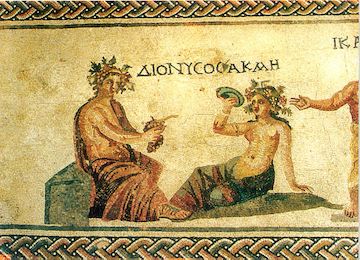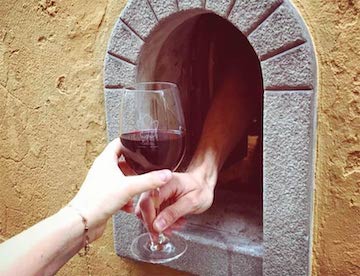Wine Is the Celebration of Western Civilization
 Of late I’ve been re-perusing the books on my shelves that explore Western Civilization. The volumes are many and varied. They range from biographies of notable historians and explorations into 18th Century European commerce to straight histories of regions and peoples as well as momentous events in Western Civilization.
Of late I’ve been re-perusing the books on my shelves that explore Western Civilization. The volumes are many and varied. They range from biographies of notable historians and explorations into 18th Century European commerce to straight histories of regions and peoples as well as momentous events in Western Civilization.
It is perhaps due to my profession, but as I look over these works, it becomes clear that if Western Civilization has produced a thing that more efficiently and accurately serves as its calling card than wine, I don’t know what it is.
Perhaps there are ideas and a set of ethos that could better act as Western Civilization’s calling card. Individualism, freedom of conscience, freedom of religion, and Christianity all come to mind. But with wine, you have a quintessential Western item that can most easily be shared.
There has been recently a robust and interesting debate over what constitutes “Western Civilization”. Is it a set of values? Is it a specific geographic region? Is Western Civilization race-based? Does the history of Western Civilization reflect a historic emphasis on the idea of progress? I don’t have an answer. Sometimes it seems that Western Civilization is like pornography.
Yet omnipresent in the history of the West or Western Civilization is wine…going back as far as the Phoenicians who used the liquid in their extensive trade relations and even as currency. The place of wine was most obviously instilled into the culture of Western Civilization with the spread of Catholicism and the institution of the Eucharist where wine symbolically takes the place of the blood of Christ.
You can follow the march of Romans across the continent with the planting of vines. You can see the development of winemaking by observing the work of monks throughout the West. And you can observe the evolution of commerce by noticing the ways in which the trade in wine is first granted as a write, then falling mercy to mercantilism and finally liberated by capitalism. As the West spreads across the ocean to different continents it takes with it not merely its customers and ideas, but its wines too.
You can see the development of winemaking by observing the work of monks throughout the West. And you can observe the evolution of commerce by noticing the ways in which the trade in wine is first granted as a write, then falling mercy to mercantilism and finally liberated by capitalism. As the West spreads across the ocean to different continents it takes with it not merely its customers and ideas, but its wines too.
Wine is Western Civilization and perhaps the perfect vehicle through which to introduce oneself to the rich cultural heritage, ideas, beliefs and history of this region/idea.
I suppose the person just embarking on a wine education or just entering the wine trade in one capacity or another could absorb the various winemaking techniques, memorize the names of the wine regions and acquaint themselves to one degree or another with the styles of wines produced today without ever delving into the historic and cultural roots of the beverage. But it seems to me you would have to try to studiously avoid the topic.
How do you appreciate California wine without being introduced to and appreciating the impact of the Franciscan priests that brought the idea of Spanish wine to the West Coast and worked in earnest with the “Mission” grape?
How do you enter into a relationship with the wines of Bordeaux without contemplating the relationship between wine and Rome conquering Gaul; without an appreciation of Henry and Eleanor’s impact on the attraction of the British people to the wines of Bordeaux? You have to work to ignore these cultural and social benchmarks and how wine is connected.
Simply by learning the names of grapes and the regions of Europe where their flourish one is introduced to the languages that built Western Civilization. I believe the connection between wine and the West is unavoidable.
It seems to me too that the curious minds that first come across wine in the East, not a set of traditional wine-drinking cultures, receive the gift of encountering an authentic and pure example of Western Civilization that provides them with a path to enter that civilization and its history. When wine travels, so does the West.
Of course, the world is smaller now and grows smaller every day as events and people and places across the globe are instantaneously in our hands and ears and eyes. But the bottle itself, on the table, surely widens perspectives if people want their perspectives widened.
Western Civilization is many things. Christianity. Judaism. Liberalism. Science. Rationalism. Democracy. Language. But as I peruse my library I’m reminded that wine is perhaps among the most enduring accomplishments of Western Civilization.

Tom
good piece– I hope you counted our book from 2012, Divine Vintage:Following the Wine Trail from Genesis to the Modern Age among those you have considered! The illustration you show at the beginning of the piece is similar to one we included in our book reflecting the legacy of Dionysian worship, wine, and the mystical/religious/pleasure nexus which wine encourages– Joel
Great Article….Write more History when you can
It is also evolved into QVC selling canned wine on TV
Bruce,
Note entirely.
There is a great book I am sure you are familiar with “The World in a Glass: Six Drinks That Changed History.” Wonderful read.
When I began to read your post, I was instantly brought back to the question of “Social Influencers” and the claim in your Q&A column back in April that you were a defender of “elitism” and “snobbery”.
Of course, I agree with you and the viewpoints you express above but there is this anti-intellectualism in vogue today that say’s this lexicon of facts and tidbits is part of your privilege….part of the patriarchy.
Amber Lucas was saying this about old white men and the old standard ways of looking/ presenting a topic like wine… James Lawrence’s piece summed up the anti-intellectual ethos perfectly in his article about Wine Influencers – Khmer Rouge is perfect imagery.
The personal biases of whoever is doing the exploration have created this viewpoint that learning the history of Catholicism and the Romans are important and exciting and hold some value when you drink a glass of wine…. rather than being patriarchal and frankly a form of aggression. Why must I learn?
If you think you are not condescending with this view…. then you are condescending.
The Kafka trap if someone denies being x it is taken as evidence that the person is x since someone who is x would deny being x.
Your appeal to embrace this knowledge….is my oppression. Mediocracy is the corrosive ideology du jour. Henry and Eleanor? That bar is much too high. Holding a bottle of Bordeaux in a string Bikini….well most everyone can do that.
Sadly, we have stopped creating intellectuals….and now we are left with activist and pithy Tik-Tok videos.
This wonderful gateway to knowledge of the history of wine intertwined into our remarkable western culture is just one last gasp of a western-centric mansplainer. Ha, ha.
ACV,
I am not quite as down on the prospects for informed imbibing and writing about the imbibed. No matter the vogue ideas of the present, in the end Western Civilization and its ideas and its drinks strike me as such a compelling topic to explore that even pressure from the dolts won’t press people away. But I get your points.
Not only is wine a celebration of western civilization, the argument has been successfully made (another reader pointed out Tom Standage’s “A History of the World in 6 Glasses” that western civilization might not exist without wine (and beer).
One of the earliest and most complete written laws in history, Hammurabi’s code (approximately 1800 BC) demanded capital punishment for adulterating or selling fake wine. Clearly reflecting wine’s importance in ancient societies over 4,000 years ago.
More recent research has identified that approximately 10 Million Years ago a genetic change occurred in our ancestors’ DNA allowing their bodies to process alcohol. The current theory is this genetic shift increased available food sources, specifically fruit rotting on the ground undergoing fermentation. This timing correlates with the evolutionary split of the genus pan (common ancestor to humans and chimpanzees), from the primary hominidae line. Consequently it hypothesized that the ability to process alcohol caused an evolutionary junction point.
Wine and humanity intertwine from the very beginning. Fascinating to consider humankind’s entire history may not be possible if it weren’t for wine. I will drink to that!
Well chimpanzees seem well able to imbibe and process wine. https://www.bbc.com/news/science-environment-33050939
Well that’s embarrassing bollox. Does it reflect your normal output, cuz hadn’t heard of you before – somewhat thankfully.
Well, Hugh, you’ll let us know when you get around to offering something of substance.
“Wherever people have chosen to settle and live, they have first of all made quite sure that there was a supply of water, but whenever they have attained a higher measure of civilization or culture, they have always spent a good deal of their time, labor and hard-earned money that they and theirs might drink wine.” André Simon (1877-1970) from ‘How to Enjoy Wine’